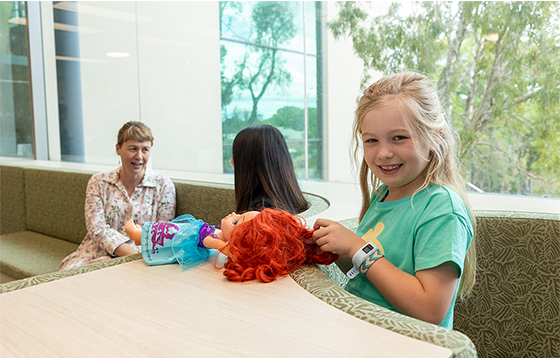Search

News & Events
For kids, by kids: New “Boom Boom” song teaches children how to prevent deadly heart diseaseOnce you hear it, you won’t be able to get it out of your head – and that’s exactly the point of the new song ‘Boom Boom’.
Research
PlaygroupsThe importance of play for a child’s development is irrefutable. Playgroups provide a safe environment for children of similar ages to play and develop prior to starting school.

CliniKids has two clinics - in Subiaco and also in Joondalup.

This series aims to provide some practical and evidence-based ideas to support your child and family.
Research
Community perspectives on the appropriateness and importance of support goals for young autistic childrenResearchers do not know much about what autistic adults, parents and professionals think about support goals for young autistic children. People's views of support goals might also be influenced by their beliefs about early support more generally. This survey involved 87 autistic adults, 159 parents of autistic children and 80 clinical professionals living in New Zealand and Australia.

News & Events
Worrying trends reinforce need for kids health researchChild health experts are concerned by a significant increase in the number of Australian children requiring learning support at school.

News & Events
Autism researcher named 40 under 40 finalistAndrew Whitehouse has been listed in the WA Business News 40 under 40 awards recognising accomplished and dynamic young leaders in Western Australia.
News & Events
Hormones in utero influence facial structureHormone levels in the womb may determine how masculine or feminine your facial features are as an adult, The Kids Research Institute Australia researchers have found.
Research
Improving the Journey Before, During and After Diagnosis of a Neurodevelopmental Condition: Suggestions from a Sample of Australian Consumers and ProfessionalsThe current study used a transdiagnostic approach to explore experiences of consumers and professionals on how the process of assessing and diagnosing neurodevelopmental conditions can be improved.
Research
Australian Clinicians’ Considerations When Choosing an Assessment of Functioning Tool for Children with Neurodevelopmental ConditionsIn the Australian disability context, the assessment of children with neurodevelopmental conditions’ functioning (across all domains) is of increasing importance, particularly since the introduction of the National Disability Insurance Scheme. Currently, there is wide variability across assessment of functioning practices, including the choice and use of published tools for assessment.
